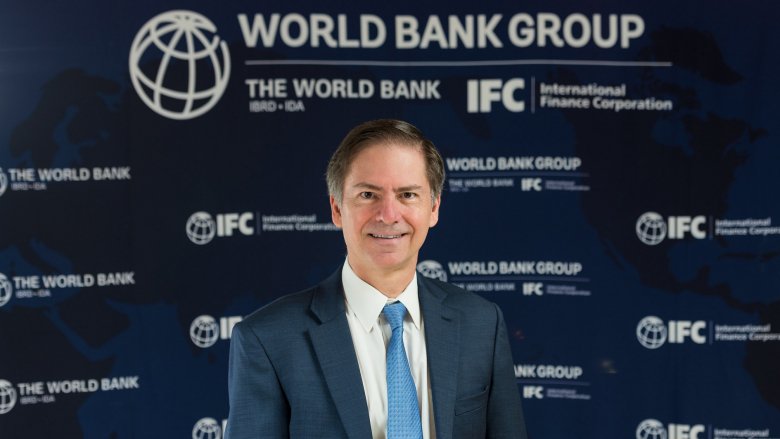Carlos Felipe Jaramillo is the World Bank Vice President for the Latin America and the Caribbean Region, overseeing Bank relations with 31 countries and a portfolio of ongoing projects, technical assistance and grants of almost US$32 billion. Under his leadership, the Bank’s operations in the region focus on strengthening human capital through education and inclusion programs, increasing resilience to shocks and supporting inclusive recovery and green growth.

Carlos Felipe Jaramillo, World Bank Vice President for the Latin America and the Caribbean Region.
What does the digital transformation look like in Latin America and the Caribbean (LAC)?
The LAC trends toward digitalization have supported the region’s social and economic development over the past decades. Yet COVID-19 put in stark relief the urgent need to accelerate digitalization. Online technologies that were lifelines during the pandemic, enabling mobile money transfers, telemedicine and online schooling, have helped speed up adoption in a place that has long lagged in broad uptake.
This transformed environment offers promising opportunities for post-pandemic recovery. The region has experienced significant growth in the digitization of payments and the benefits it brings - empowering people and businesses, boosting trade, and expanding access to financial services. Online small and medium exporters can now diversify their customer base, reaching up to 20 foreign markets, compared to two to five for offline exporters. Investment opportunities have surged, with a quadrupling of unicorns—companies backed by venture capital with over US$1 billion in revenue—from 4 in 2018 to 18 in 2021, predominantly built on digital platforms. And ensuring universal connectivity in the region could create up to 15 million jobs in LAC.
Yet, challenges remain. 45 million people are still offline, especially those in remote areas, women, the elderly and indigenous groups. 240 million are covered by mobile internet but not using it because it’s too expensive or they don’t know how. And with over 20 percent of jobs in some countries likely to undergo some kind of automation, the region needs major investments in education and training to equip workers with the necessary digital skills.
How will the collaboration between the World Bank and the Inter-American Development Bank (IDB) help bridge the digital-access gap across the region?
The World Bank and the IDB are working together to maximize efforts in critical development areas, such as digitalization, to achieve a stronger and better impact. We are collaborating on several projects to narrow the connectivity gap and boost sustainable digitalization.
Through a joint initiative, building on projects from both institutions, we can help increase access to connectivity, devices, educational platforms, and digital skills development for students and teachers in the region, aiming at benefitting over 3.5 million students, more than 350,000 teachers, and 12,000 schools in 16 countries.
One of the main challenges in getting more people to use the internet in the region is lack of digital skills. How is the World Bank working to address this?
Digital skills are critical for a thriving and inclusive digital economy. Yet, it remains a challenge for many in the region. Only around a third of adults in LAC countries have digital skills, compared to 64 percent in OECD countries. Women in rural areas are particularly disadvantaged, as they are 37 percent less connected than men, leading to fewer opportunities for participation in high-paying job markets.
Research efforts through the Digital Economy Initiative for Latin America and the Caribbean (DE4LAC) have highlighted the importance of reforms and investments to enhance online skills. Through our work, the World Bank is financing initiatives to boost capacities so people can get online and use digital tools productively. For example, a US$ 200 million project in Argentina offers basic and advanced digital skills training and expands broadband infrastructure to provide internet in remote areas. As I mentioned earlier, efforts like the Connected Schools for All initiative are also underway to build these skills early on.
How can digital shape the climate future in LAC?
While LAC is responsible for only 8 percent of global greenhouse gas emissions, with agriculture, land use and deforestation accounting for 47 percent of emissions, this is one of the world’s most vulnerable places when it comes to the destructive power of climate related disasters. Disruptions in energy and transport infrastructure as a result of climate-related events cost up to 1 percent of regional GDP annually.
Digital technologies are crucial to both cope with the impacts of climate change and to reduce the region’s emissions. Online tools and platforms are the foundations for climate monitoring, early warning systems, or quickly getting government assistance payments to people in the aftermath of floods or earthquakes. Digital technologies also support agricultural resilience, increased productivity, water management, energy efficiency, and biodiversity protection.
In Peru, we are supporting the development of a centralized emergency response system, which increases the capacity for disaster response when a wildfire or landslide hits. Similarly, in Argentina, we finance data infrastructure foundations to increase digital resilience and respond effectively to emergencies.
In the Brazilian Amazon, we are extending digital infrastructure so that communities, even in the most isolated areas, have access to reliable internet and related services and can use online tools to track and reduce deforestation.
We have seen great strides when it comes to digitalization, but the full potential of the region's wiring for growth, inclusion and service delivery remains untapped. We look forward to ongoing collaboration with governments and the private sector so that all countries in LAC have the strong foundations for the digital economy to thrive.
